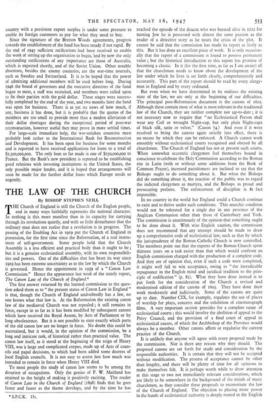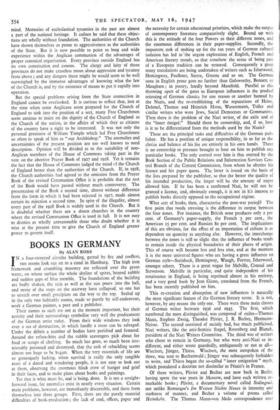THE LAW OF THE CHURCH
By BISHOP STEPHEN NEILL
THE Church of England is still the Church of the English people, and in many ways faithfully represents the national character. In nothing is this more manifest than in its capacity for carrying through its revolutions quietly, and with so little disturbance that the ordinary man does not realise that a revolution is in progress. The passing of the Enabling Act in 1919 put the Church of England in possession, for the first time since the Reformation, of a real instru- ment of self-government. Some people hold that the Church Assembly is a less efficient and practical body than it ought to be ; but it is as genuine ecclesiastical assembly, with its own responsibili- ties and powers. One of the difficulties that has beset its way since 1919 has been extreme uncertainty as to the law by which the Church is governed. Hence the appointment in 1939 of a " Canon Law Commission." Hence the appearance last week of the stately report, The Canon Law of the Church of England.*
The first answer returned by the learned commission to the ques- tion asked them as to " the present status of Canon Law in England " is that, though the ChurCh of England undoubtedly has a law, no one koows what that law is. At the Reformation the existing canon law of the mediaeval Church was not repealed ; it still remains in force, except in so far as it has been modified by subsequent canons which have received the Royal Assent, by Acts of Parliament or by long obsolescence. But it is not possible to state exactly which parts of the old canon law are no longer in force. No doubt this could be ascertained, but it would, in the opinion of the commission, be a long and intricate task, of historical rather than practical value. The canon law itself, as it stood at the beginning of the reign of Henry VIII, was 'a large and complicated corpus, made up of Acts of coun- cils and papal decisions, to which had been added some decrees of local English councils. It is not easy to assess just how much was intended to remain in force when Henry VIII died.
To most people the study of canon law seems to be among the dreariest of occupations. Only the genius of F. W. Maitland has attained to the height of making it positively exciting. The reader of Canon Law in the Church of England (1898) finds that he goes faster and faster as the theme develops, and by the time he has * S.P.C.K. 15s.
reached the episode of the deacon who was burned alive in 1222 for turning Jew he is possessed- with almost the same passion as the reader of a detective story as he nears the crisis of the plot. It cannot be said that the commission has made its report as lively as this. But it has done an excellent piece of work. It is only occasion- ally that the report of a commission is found to possess permanent value ; but the historical introduction to this report has promise of becoming a classic. In it (for the first time, as far as I am aware) all that the churchman needs to know about the development of the law under which he lives is set forth clearly, comprehensively and accurately. This part of the report should be read by every clergy- man in England and by every ordinand.
But even when we have determined in its outlines the existing state of the law, we are only at the beginning of our difficulties. The principal post-Reformation document is the canons of 11503. Although these contain most of what is most relevant in the traditional law of the Church, they are neither complete nor up-to-date ; it is not necessary now to require that " no Ecclesiastical Person shall wear any Coif or wrought Night-cap, but only plain Night-caps of black silk, satin or velvet." (Canon 74.) And even if it were resolved to bring the canons again strictly into effect, there is no means by which they can be enforced. A Church cannot work smoothly without ecclesiastical courts recognised and obeyed by all churchmen. The Church of England has not at present such courts. When somewhat eccentric clergymen feel themselves bound in conscience to celebrate the Holy Communion according to the Roman rite in Latin (with or without some additions from the Book of Common Prayer), incensed parishioners are inclined to say that the Bishops ought to do something about it. But when the Bishops did do something about it, the reaction of the public was to regard the indicted clergymen as martyrs, and the Bishops as proud and persecuting prelates. The enforcement of discipline is In fact impossible.
In no country in the woad but England could a Church continue to exist and to thrive under such conditions. This anarchic condition would not be tolerated for a single day in any province of the Anglican Communion other than those of Canterbury and York. The commission is unanimously of the opinion that something ought to be done about it. With wise English caution, the commission does not recommend that any attempt should be made to draw up a comprehensive code of ecclesiastical law, such as that by which the jurisprudence of the Roman Catholic Church is now controlled. The members point out that the experts of the Roman Church spent thirteen years on a task easier than that which would confront an English commission charged with the production of a complete code. And they are of opinion that, even if such a code were completed, it might well fail to win acceptance, owing to " the ineradicable repugnance in the English mind and juridical tradition to the prin- ciple of codification" (p. 82). What they have done instead is to put forth for the consideration of the Church a revised and modernised edition of the canons of 1603. They have done their work moderately and judiciously. Some of the canons are quite up to date. Number CIX, for example, regulates the use of places of worship for plays, concerts and the exhibition of cinematograph films. A very important section provides for a complete range of ecclesiastical courts ; this would involve the abolition of appeal to the Privy Council, and the provision of a final court of appeal in ecclesiastical causes, of which the Archbishop of the Province would always be a member. Other canons affirm or regularise the current practice of the Church. It is unlikely that anyone will agree with every proposal made by the commission. Nor is there any reason why they should. The proposed canons are set forth for study and consideration by the responsible authorities. It is certain that they will not be accepted without modification. The process of acceptance cannot be other than lengthy, and there will be plenty of time for all opinions to make themselves felt. It is perhaps worth while to draw attention at this stage to two not immediately relevant considerations, which are likely to be somewhere in the background of the minds of many churchmen, as they consider these proposals to reconstitute the law of the Church of England. The objection to placing more power in the hands of ecclesiastical authority is deeply rooted in the English mind. Memories of ecclesiastical tyrannies in the past are almost a part of the national heritage. It cannot be said that these objec- tions are wholly without foundation. The authorities of the Church have shown themselves as prone to aggressiveness as the authorities of the State. But it is now possible to point to long and wide experience within the Anglican communion of the advantages of proper canonical organisation. Every province outside England has its own constitution and canons. The clergy and laity of those provinces do not make ceaseless moan about aggression and tyranny from above ; and any dangers there might be would seem to be well outweighed by the immense advantages of knowing what the law of the Church is, and by the existence of means to put it rapidly into operation.
But the special problems arising from the State connection in England cannot be overlooked. It is curious to reflect that, just at the time when some Anglicans seem prepared for the Church of England to sink into the position of a sect, many Free Churchmen seem anxious to insist on the dignity of the Church of England as the Church of the nation, in the affairs of which they as citizens of the country have a right to be interested. It was not only the personal greatness of William Temple which led Free Churchmen so often to speak of him as " our Archbishop." The anomalies and uncertainties of the present position are too well known to need description. Opinion will be divided as to the suitability of non- Anglican members of the House of Commons taking part in the vote on the abortive Prayer Book of 1927 and 1928. Yet it remains the fact that the House of Commons judged the mind cf the Church of England better than the authorities of the Church. If, in 1928, the Church authorities had agreed to the omission from the Prayer Book of the revised Communion Office it is probable that the rest of the Book would have passed without much controversy. The presentation of the Book a second time, almost without difference from the form in which it had been rejected in 1927, made almost certain its rejection a second time. In spite of the illegality, almost every part of the 1928 Book is widely used in the Church. But it is doubtful whether there are a dozen churches in the country where the revised Communion Office is used in full. It is not easy to dismiss as wholly unreasonable those who doubt whether it is wise at the present time to give the Church of England greater power to govern itself.



































 Previous page
Previous page